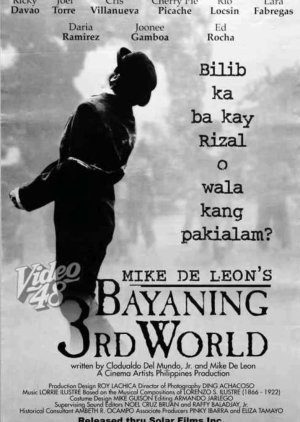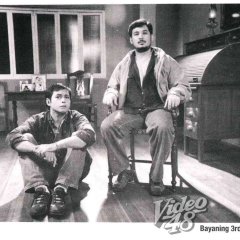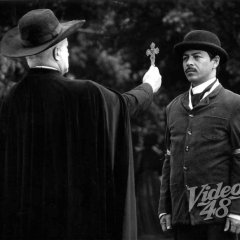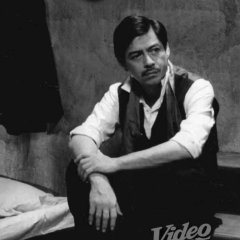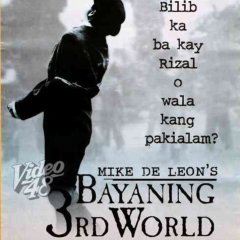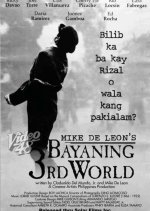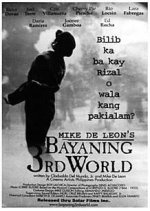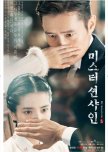 Ask MDL And Now For Something Different: Historical (September)
Ask MDL And Now For Something Different: Historical (September) Two filmmakers try to create a film venturing on the life of José Rizal. Before they do that, they try to investigate on the heroism of the Philippine national hero. Of particular focus is his supposed retraction of his views against the Roman Catholic Church during the Spanish regime in the Philippines which he expressed primarily through his two novels Noli Me Tangere and El Filibusterismo. The investigation was done mainly by "interviewing" key individuals in the life of Rizal such as his mother Teodora Alonso, his siblings Paciano, Trinidad, and Narcisa, his love interest and supposed wife Josephine Bracken, and the Jesuit priest who supposedly witnessed Rizal's retraction, Vicente Balaguer. Eventually, the two filmmakers would end up "interviewing" Rizal himself to get to the bottom of the issue. (Source: Wikepedia) Edit Translation
- English
- magyar / magyar nyelv
- dansk
- Norsk
- Native Title: Bayaning 3rd World
- Also Known As: 3rd World Hero , Bayaning Third World
- Screenwriter & Director: Mike de Leon
- Genres: Historical, Drama
Cast & Credits
- Joel TorreJose RizalMain Role
- Ricky Davao[Filmmaker 1]Support Role
- Cris Villanueva[Filmmaker 2]Support Role
- Cherry Pie PicacheNarcisaSupport Role
- Lui ManansalaMariaSupport Role
- Daria RamirezDoña TeodoraSupport Role
Reviews

When the only interesting part of someone's life is their execution.
This docudrama is surprisingly hilarious. It's also cleverly meta – in more ways than one.Bayaning 3rd World follows a couple of filmmakers keen to cast a critical eye on José Rizal as The Phillipines' national hero. But at the same time, they struggle to figure out how to transform their take on Rizal's life into an engaging movie. So Bayaning 3rd World is a story about telling the story.
The humour comes from the filmmakers (who are not the actual filmmakers, btw, they're actors). They playfully navigate and interrogate this huge figure of Filipino nationalism. The storytelling style reflects this playfulness too – the filmmakers sit down with Rizal's family members and "interview" them. None of this is to say they are disrespectfully mocking Rizal. Quite the contrary, it's clear that the makers of Bayaning 3rd World are 100% sincere in their poking and prodding of what has made Rizal into a national hero.
One sticking point is Rizal's "retraction document". Supposedly, just before his death, Rizal converted back to Catholicism and, in doing so, retracted all his previous criticisms of the Church. But Bayaning 3rd World questions this version of events, suggesting that the document might be inauthentic. Why the fuss? Well, as one of the filmmakers points out, in Rizal's era, the Church and the State were one and the same. So for Rizal to renounce his criticism of the State would make him less worthy of national hero status.
To add another layer to this meta docudrama, it's important to note that director Mike de Leon made Bayaning 3rd World in response to the film 'José Rizal'. Directed by Marilou Diaz-Abaya, 'José Rizal' had come out two years earlier in 1998 as part of the centenary commemorations of Filipino independence.
To quote Antonio D. Sison's commentary, "In Diaz-Abaya’s film, Rizal is the prodigal son who returns to the colonial Catholic religion of his oppressors and renounces the very works that 'served to restore dignity, self respect, pride, and patriotism among the Filipinos'. De Leon makes an intellectual and entertaining effort at questioning this cut-and-dry story but without actually providing answers himself".
At the end of the day – hero or not – Rizal is still the central character to Bayaning 3rd World. Of course, it could've been otherwise. As one of the filmmakers remarks more than once after "interviewing" one of the women in Rizal's life – "Her life would be a much more interesting movie than Rizal's!"
===
Antonio D. Sison's review: https://www.sensesofcinema.com/2005/feature-articles/3rd_world_hero/

